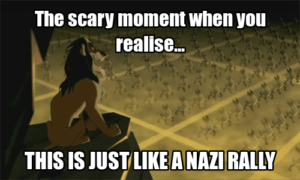 I love The Lion King. It’s one of my all-time favorites. It’s the perfect mix of story, music, and that indescribable Disney magic. Have you ever heard someone say, “Hakuna Matata,” and not responded with, “What a wonderful phrase?” With the recent birth of my daughter, I wanted to immediately show her my favorite Disney flick. But watching it again made me realize how intense some moments are. I remembered the trampling of Mufasa (quite arguably the saddest scene ever), but I totally forgot about the dark and dreary Scar, a villain whose actions can easily scare young children. And while the hero triumphs in the end, Scar’s vileness may not yet be appropriate for my daughter.
I love The Lion King. It’s one of my all-time favorites. It’s the perfect mix of story, music, and that indescribable Disney magic. Have you ever heard someone say, “Hakuna Matata,” and not responded with, “What a wonderful phrase?” With the recent birth of my daughter, I wanted to immediately show her my favorite Disney flick. But watching it again made me realize how intense some moments are. I remembered the trampling of Mufasa (quite arguably the saddest scene ever), but I totally forgot about the dark and dreary Scar, a villain whose actions can easily scare young children. And while the hero triumphs in the end, Scar’s vileness may not yet be appropriate for my daughter.
This week we read Parashat Korach. Korach the man is very similar to Scar. Determined to dethrone the leader, Korach surrounds himself with creepy and suspicious sidekicks (although none sound like Cheech Marin), and they help implement his plan. Korach even draws a large and loyal following like Scar’s hyenas. Even Ramban’s explanation of Korach’s followers sounds like the misfits from the Lion King; “He [Korach] had acquired [heathen] slaves and bondmaids.” And in the end both villains fall to their deaths. But in the Lion King the hero is Simba, and in Parashat Korach the hero is God.
Most people find the miracle God performs in Korach the hardest part to relate to. People can relate to a scared lion cub with a heart of gold growing into a brave warrior who saves his pride (of lions). Yet when God opens up the earth to swallow evil, people heavily doubt it. Yes, one is supposedly make-believe and the other is taught by many as truth. But while we can fathom a tangible person (or in this case a lion) defying all odds in a classic rags-to-riches story, we can’t see God as using equal or even greater heroics.
That is why Ramban goes on to write that when the text (Numbers 16:33) says, “And they perished from among the assembly,” it means “that they [Korach and his associates] perished in their sight [that of the people], while standing amongst them in the midst, since the earth suddenly opened up its mouth and closed it upon them, and the place where they had been [standing] was not noticeable.” I believe Ramban makes it a point to say that God’s actions had been witnessed, because it is human nature to only believe what is seen.
It is fair to say that not all of God’s miracles are understood, both in a physical and spiritual sense. Because today we do not see the earth open up and then immediately close up with the intention of ridding the world of evil, it’s human nature to question or even not believe. But Ramban tried to make sure that this story retained its believability by explaining that this miracle was experienced and witnessed. And I hope when I do finally show my daughter The Lion King she can comprehend the greatness of all sorts of miracles and the power of a good story. I hope that just like we can comprehend that a cartoon lion can overcome tough odds and understand how that can impact our lives, so too can we believe that God can overcome so much more.




Very insightful! Enjoyed reading your perspective.